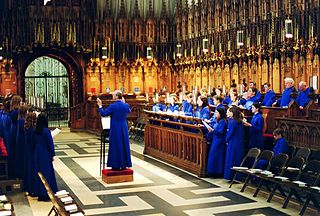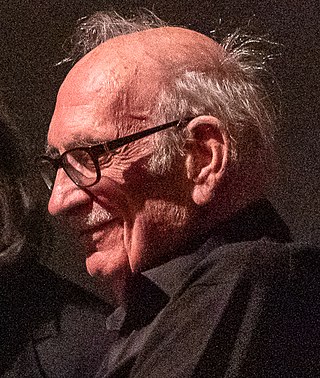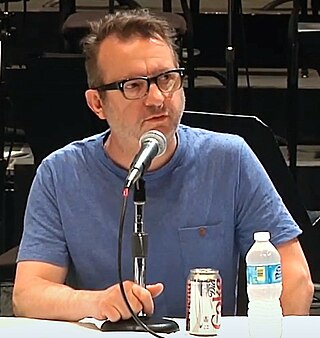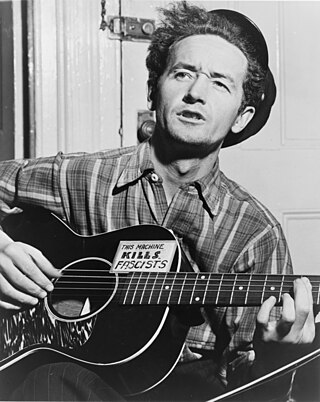Related Research Articles

Woodrow Wilson Guthrie was an American singer-songwriter and composer who was one of the most significant figures in American folk music. His work focused on themes of American socialism and anti-fascism. He inspired several generations both politically and musically with songs such as "This Land Is Your Land".

A choir, also known as a chorale or chorus is a musical ensemble of singers. Choral music, in turn, is the music written specifically for such an ensemble to perform or in other words is the music performed by the ensemble. Choirs may perform music from the classical music repertoire, which spans from the medieval era to the present, or popular music repertoire. Most choirs are led by a conductor, who leads the performances with arm, hand, and facial gestures.

George Henry Crumb Jr. was an American composer of avant-garde contemporary classical music. Early in his life he rejected the widespread modernist usage of serialism, developing a highly personal musical language which "range[s] in mood from peaceful to nightmarish". Crumb's compositions are known for pushing the limits of technical prowess by way of frequent use of extended techniques. The unusual timbres he employs evoke a surrealist atmosphere which portray emotions of considerable intensity with vast and sometimes haunting soundscapes. His few large-scale works include Echoes of Time and the River (1967), which won the 1968 Pulitzer Prize for Music, and Star-Child (1977), which won the 2001 Grammy Award for Best Contemporary Classical Composition; however, his output consists of mostly music for chamber ensembles or solo instrumentalists. Among his best known compositions are Black Angels (1970), a striking commentary on the Vietnam War for electric string quartet; Ancient Voices of Children (1970) for a mixed chamber ensemble; and Vox Balaenae (1971), a musical evocation of the humpback whale, for electric flute, electric cello, and amplified piano.

Mark-Anthony Turnage is an English composer of contemporary classical music.

"This Land Is Your Land" is a song by American folk singer Woody Guthrie. One of the United States' most famous folk songs, its lyrics were written in 1940 in critical response to Irving Berlin's "God Bless America". Its melody is based on a Carter Family tune called "When the World's on Fire". When Guthrie was tired of hearing Kate Smith sing "God Bless America" on the radio in the late 1930s, he sarcastically called his song "God Blessed America for Me" before renaming it "This Land Is Your Land".

Gilbert Vandine "Cisco" Houston was an American folk singer and songwriter, who is closely associated with Woody Guthrie due to their extensive history of traveling and recording together.

Jake Heggie is an American composer of opera, vocal, orchestral, and chamber music. He is best known for his operas and art songs as well as for his collaborations with internationally renowned performers and writers.

Patrick Hawes is a British composer, conductor, organist and pianist.

Ramblin' Jack Elliott is an American folk singer, songwriter and story teller.

The Woody Guthrie Folk Festival is held annually in mid-July to commemorate the life and music of Woody Guthrie. The festival is held on the weekend closest to July 14 – the date of Guthrie's birth – in Guthrie's hometown of Okemah, Oklahoma. Daytime main stage performances are held indoors at the Brick Street Cafe and the Crystal Theatre. Evening main stage performances are held outdoors at the Pastures of Plenty. The festival is planned and implemented annually by the Woody Guthrie Coalition, a non-profit corporation, whose goal is simply to ensure Guthrie's musical legacy. The event is made possible in part from a grant from the Oklahoma Arts Council. Mary Jo Guthrie Edgmon, Woody Guthrie's younger sister, is the festival's perennial guest of honor.
The Woody Guthrie Foundation, founded in 1972, is a non-profit organization which formerly served as administrator and caretaker of the Woody Guthrie Archives. The Foundation was originally based in Brooklyn, New York and directed by Woody Guthrie's daughter Nora Guthrie.

David Alan Miller is a multi-Grammy Award-winning American symphony orchestra conductor, and since 1992, music director of the Albany Symphony Orchestra. Miller served as assistant and associate conductor of the Los Angeles Philharmonic from 1987–92 and music director of the New York Youth Symphony from 1982-88. He is currently also Artistic Advisor to both the Sarasota Orchestra and to The Little Orchestra Society in New York City.

Nora Lee Guthrie is the daughter of American folk musician and singer-songwriter Woody Guthrie and his second wife Marjorie Mazia Guthrie, sister of singer-songwriter Arlo Guthrie, and granddaughter of renowned Yiddish poet Aliza Greenblatt. Nora Guthrie is president of The Woody Guthrie Foundation, president of Woody Guthrie Publications and founder of the Woody Guthrie Archive, and lives in Mt. Kisco, New York.

Robert Wayne Childers was an American country-folk musician and singer-songwriter from the state of Oklahoma. Both before and after his death, he achieved widespread critical acclaim having been compared to songwriters such as Bob Dylan and Woody Guthrie. Childers is often labeled the "father", "grandfather", or "godfather" of the regional Oklahoman music scene known as Red Dirt music.

Mohammed Fairouz is an American composer.

Radoslav Lorković is a Croatian-born and classically trained folk and blues musician, known in particular for his flair on the piano and accordion. He has six solo studio recordings, three live albums and has recorded and performed with numerous artists including Odetta, Asleep at the Wheel, Jimmy LaFave, Shawn Mullins, Greg Brown, Richard Shindell, Ellis Paul, Susan Werner, Ronny Cox, Dave Moore, Andy White, Bo Ramsey, and Ramsay Midwood. His 49 year career as a touring musician has taken him around the world, where he has performed from castles in Italy to Carnegie Hall.

The Woody Guthrie Center is a public museum and archive located in Tulsa, Oklahoma that is dedicated to the life and legacy of American folk musician and singer-songwriter Woody Guthrie. The Center also contains the archives of folk singer, songwriter, and fellow social activist Phil Ochs.

"Old Man Trump" is a song with lyrics written by American folk singer-songwriter Woody Guthrie in 1954. The song describes what Guthrie felt were the racist housing practices and discriminatory rental policies of his landlord, Fred Trump, father of former president and current president-elect Donald Trump. In January 2016, Will Kaufman, a Guthrie scholar and professor of American literature and culture at the University of Central Lancashire, unearthed the handwritten lyrics while conducting research at the Woody Guthrie Archives in Tulsa, Oklahoma. There are no known Guthrie recordings of this song.

Cries of London is a composition for eight voices by Italian composer Luciano Berio. Originally composed for six voices in 1974, it was expanded in 1976.
References
- ↑ "Artist MICHAEL DAUGHERTY". Recording Academy GRAMMY AWARDS. Retrieved May 19, 2020.
- ↑ "Voice and Orchestra or Chamber Ensemble". Michael Daugherty, Composer. May 3, 2020.
- ↑ "About this Recording: 8.559889 – DAUGHERTY, M.: This Land Sings: Inspired by the Life and Times of Woody Guthrie". naxos.com. May 3, 2020.[ permanent dead link ]
- 1 2 3 "This Land Sings: Inspired by the Life and Times of Woody Guthrie". Michael Daugherty, Composer. Retrieved May 19, 2020.
- 1 2 3 4 5 6 7 8 9 10 11 12 13 14 15 16 17 18 19 Daugherty, Michael (2016). This Land Sings: Inspired by the Life and Times of Woody Guthrie (musical score). Ann Arbor, Mi: Michael Daugherty Music.
- ↑ "This Land Sings: Inspired by the Life and Times of Woody Guthrie". fabermusic.com. May 3, 2020.
- ↑ "DAUGHERTY, M.: This Land Sings: Inspired by the Life and Times of Woody Guthrie (Socolofsky, J. Daugherty, Dogs of Desire, D.A. Miller)". Naxos. Retrieved May 3, 2020.
- ↑ "The Carter Family- When The World's on Fire". December 22, 2008. Retrieved May 19, 2020– via YouTube.
- ↑ "Woody Guthrie- This Land Is Your Land". November 29, 2008. Retrieved May 19, 2020– via YouTube.